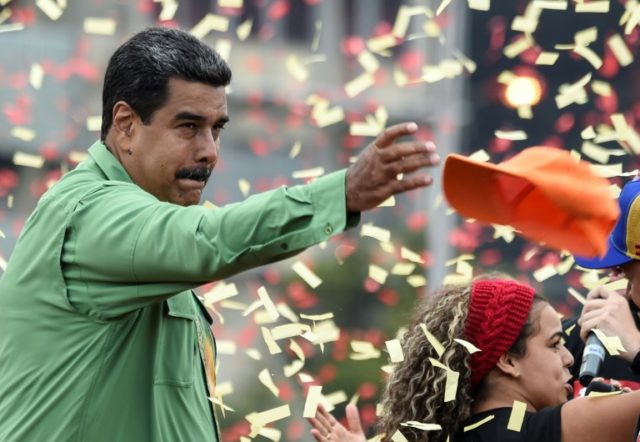National Security Advisor John Bolton urged Venezuelan dictator Nicolás Maduro to step aside and allow legitimate President Juan Guaidó to govern the country and hoped he does not end up “in some other beach area like Guantánamo” in an interview Friday.”
Speaking to host Hugh Hewitt, Bolton suggested that Maduro still had time to leave his position as socialist dictator and not incur too many personal consequences. Maduro has refused to leave power since Guaidó took an oath of office last week. The Venezuelan constitution requires the people to disavow a president that violates human rights or disrupts the democratic order (Articles 333 and 350), and allows the National Assembly, the federal legislature, to appoint an interim president.
Maduro claims authority after having “won” a presidential election in which he banned opposition candidates from running and deployed violent gangs to threaten Venezuelans at the ballot. International observers have deemed the May 2018 election a fraud.
“I wish him a long, quiet retirement on a pretty beach far from Venezuela,” Bolton said of Maduro on Hewitt’s program. “And the sooner he takes advantage of that, the sooner he’s likely to have a nice, quiet retirement on a pretty beach rather than being in some other beach area like Guantanamo.”
Bolton added that “all options are on the table” for the United States to help Venezuelans reconstruct their democracy after two decades of socialism, but that “this is not a made in the USA effort” and that Guaidó’s constitutional takeover was a grassroots campaign concluding years of peaceful protests in the country.
“What we’re trying to do is work with interim President Juan Guaidó,” Bolton explained. “You know, we don’t want to give Maduro the, any basis for an argument that somehow he’s a puppet of ours. He’s [Guaidó] a brave and independent leader. He’s got a series of, I think, very brave people around him.”
Guaidó is a former student leader against dictator Hugo Chávez and a founding member of Popular Will, a socialist opposition party led by political prisoner Leopoldo López. Popular Will’s political manifesto expresses support for rights to food, shelter, and health care, and when not condemning the dictatorship, the party’s policy proposals typically involve government programs to aid the poor and major government intervention in daily life. Guaidó’s “Plan País” (National Plan), his policies for reconstructing Venezuela after Maduro, center around using proceeds from the state-run oil company Petróleos de Venezuela (PDVSA) to fund major health care and infrastructure initiatives.
Despite his ideological distance from the Trump administration, the White House has been deeply supportive of Guaidó’s call for the military to stop supporting Maduro so the country can organize free and fair elections as soon as possible. To facilitate this, Guaidó and the National Assembly have offered blanket amnesty from prosecution to soldiers who switch allegiances away from Maduro.
The American military’s facility at Guantánamo Bay rose to prominence as a detention center in the aftermath of the September 11, 2001 jihadist attacks. The administration of then-President George W. Bush chose to use the facility to house suspect al-Qaeda members while they investigated who orchestrated the attacks and how they planned them.
While President Barack Obama promised to release all prisoners at Guantánamo on his first day in office, he failed to do so throughout eight years. President Donald Trump exhibited a much more favorable attitude towards the facility as a candidate, offering to “load it up with some bad dudes.” A 2017 report suggested the Pentagon was planning a nearly $500 million investment in overhauling the facility.
Maduro is not believed to have any close ties with al-Qaeda. His regime, however, has allowed the Shiite terrorist group Hezbollah to expand its jihadist and drug trafficking operations in Latin America. Many reports have singled out current minister and former Vice President Tareck El Aissami as a recruiter for the Iranian-backed jihadist group; the United States has sanctioned him under the Drug Kingpin Act.
Hezbollah was among a number of Islamist organizations and leaders – including Hamas, the Palestinian Liberation Organization (PLO), and the governments of Iran, Turkey, and Syria – to reject Guaidó and profess loyalty to the Maduro regime last week.

COMMENTS
Please let us know if you're having issues with commenting.